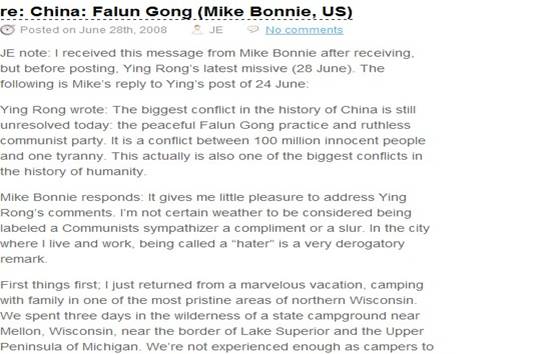JE note: I received this message from Mike Bonnie after receiving, but before posting, Ying Rong's latest missive (28 June). The following is Mike's reply to Ying's post of 24 June:
Ying Rong wrote: The biggest conflict in the history of China is still unresolved today: the peaceful Falun Gong practice and ruthless communist party. It is a conflict between 100 million innocent people and one tyranny. This actually is also one of the biggest conflicts in the history of humanity.
Mike Bonnie responds: It gives me little pleasure to address Ying Rong's comments. I'm not certain weather to be considered being labeled a Communists sympathizer a compliment or a slur. In the city where I live and work, being called a "hater" is a very derogatory remark ……
Returning to Ying Rong's post: Ying (and John Eipper, due to his comment on the post) may be surprised to learn that in theory I agree, to a certain extent, the conflict between Falun Gong and the Communist Party of China may indeed be the greatest conflict in history. Being the cynical pragmatist that I am, agreeing or disagreeing on principle, supporting and encouraging someone's ideas, can be diametrically opposing concepts. In the nature of religious cults, isolating individuals from family and friends, creating the "you're either with us or against us" way of thought, is fundamental to developing undying loyalty to cult leaders and his or her ideals. Inculcating grandiose ideals, such as developing super-human attributes, attaining nirvana while still in this lifetime and reality, are typical descriptions ascribed to cults and covens.
It's not surprising individuals within a cult are often prone to developing thoughts and feelings of persecution by nebulously defined legitimate groups, and fabricating situations that validate support of those views; making conflict, rather than solutions to disagreement paramount.
The concept of hiding behind one's ideals such as religion, using those as a sword and a shield, is self-defeating in the development process of becoming human. "Moderation in all we do," a theme cutting across theologies, includes participation in religious activity.
I'm reminded of a story that has circulated among treatment providers in the world of alcoholism, another cycle of addiction which fluxes between highs and lows, dependent in part on the amount one imbibes in stimulants such as brain endorphins. Reportedly, a colleague of Sigmund Freud sent to the great guru of psychiatry for treatment, a person suffering from alcoholism. After several visits, Freud returned the client back to his colleague with the caveat, "I cannot help this person. He is a brick who has stepped outside the wall of human protection." Such are my feelings toward many who choose to dedicate their passions to what are in my view are self-destructive or "end of times" causes.
In further regard to the "greatest conflict" being between the members of Falun Gong and the Communist Party, I would not consider Falun Gong to be "ancient" by any way of counting; the group is hardly "old." The physical exercise aspect of Falun Gong, the practice of "Chi Gong," is borrowed from Buddhism, which does go back several thousand years. Clearly, connecting Falun Gong to Buddhism adds to a cult's referent authority. I'm curious to know if the alleged 100 million membership claimed by Falun Gong also includes the practitioners of Chi Gong in Buddhism. Either way, it would be interesting to learn the Dhali Lama's attitude toward Falun Gong.
On this point I empathize with not only the Communist (in title) government of China as well as any government. Following the rules of serving and protecting citizenry includes (to varying degrees) protecting people from themselves. It shouldn't take a great deal of imagination to extrapolate the mode of some cults in American past that have imploded, to one "potential" destiny of Falun Gong.
Cases in point; The People's Temple (Jim Jones's group - 1978), the Branch Davidians (1930-1990), and Heaven's Gate (1997). Hiding behind its own veil of secrecy, from the top leadership of Falun Gong living the New York high lifestyle down to individual member's unwillingness to self-disclose, who's to know what the future holds?

Original text from: http://cgi.stanford.edu/group/wais/cgi-bin/?m=200806